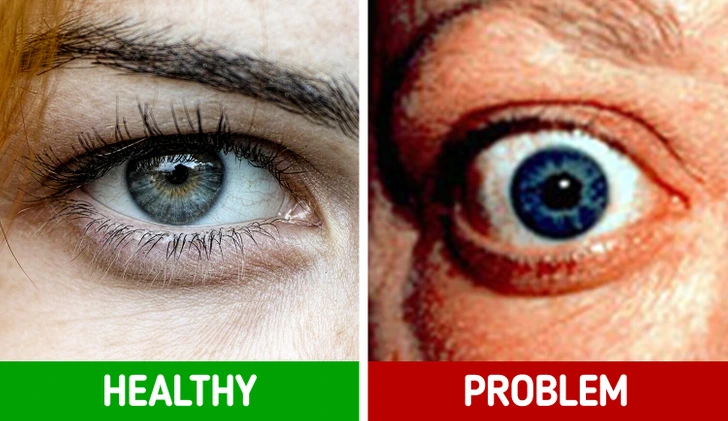Your thyroid might be small, but when it is not working properly, it can cause big problems throughout your body. Often, the early signs of thyroid trouble are subtle easy to dismiss as stress, aging, or just everyday life. But missing these clues can lead to more serious health issues down the road.
Let us dive into six important thyroid warning signs that you should never overlook and why acting early matters.
Note This article is for informational purposes only. Always seek advice from your doctor regarding any health concerns.
1. Persistent Dry Skin and Sudden Hair Changes

If your skin has become rough, dry, or flaky no matter how much lotion you use, it could be a silent cry for help from your thyroid.
An underactive thyroid, known as hypothyroidism, slows down your body’s normal processes, including the turnover of skin cells. This can leave your skin feeling rough, dull, and dry. Another telltale sign is thinning hair, especially at the outer edges of your eyebrows.
On the flip side, an overactive thyroid, called hyperthyroidism, can make your hair brittle, fine, or more prone to breakage. If your usual skincare and haircare routines are no longer doing the trick, it might be time to take a closer look at your thyroid health.
Video: 7 Silent Thyroid Symptoms You Keep Ignoring
2. Needing to Pee More Often

Your thyroid does not directly control your bladder, but when your hormones are out of balance, your kidneys and urinary habits can be affected.
Whether your thyroid is underactive or overactive, the changes in hormone levels can lead to more frequent trips to the bathroom. In some cases, it can even mimic symptoms of an overactive bladder.
If you suddenly notice you are making extra visits to the restroom without any obvious reason, it could be a sign your thyroid needs attention.
3. Feeling Extra Thirsty

Feeling unusually thirsty could be a warning flag. While it might just mean you are dehydrated, persistent and excessive thirst could also signal an overactive thyroid.
Other signs to watch for include unexpected weight loss, shaky hands, fatigue, anxiety, or feeling dizzy. If thirst is showing up alongside any of these symptoms, it is a good idea to talk with your doctor and get your thyroid checked.
4. Irregular Periods or Trouble Getting Pregnant

For women, thyroid issues can cause major disruptions to menstrual cycles.
With an underactive thyroid, periods often become heavier and last longer. With an overactive thyroid, periods may become lighter, shorter, or even skip altogether.
These hormonal imbalances can also interfere with ovulation, making it harder to conceive. If your menstrual cycle has become unpredictable or you are facing unexplained fertility challenges, your thyroid could be a hidden factor.
5. Bulging or Staring Eyes

Thyroid eye disease is an autoimmune condition where the muscles and fatty tissues around the eyes become inflamed. This can cause the eyes to bulge or appear to stare. You might also notice redness, swelling, dry eyes, or even difficulty moving your eyes properly.
In some cases, this inflammation can be serious enough to cause double vision or even damage to the optic nerve, which could lead to vision loss if untreated.
Thyroid eye disease is often linked to Graves disease, an autoimmune disorder that causes hyperthyroidism, but it can sometimes occur even when thyroid hormone levels are normal.
Signs to watch for include
- Swelling or puffiness around the eyes
- Redness in the eyelids or eyes
- Gritty feeling in the eyes
- Blurred or double vision
- Pain when moving the eyes
- Sensitivity to bright lights
If you notice changes in the way your eyes look or feel, do not ignore it. Early treatment can help prevent serious complications.
Video: Thyroid problems – most common thyroid problems, symptoms and treatment
6. Puffy Face or Swollen Features

One of the sneakier symptoms of an underactive thyroid is facial puffiness, particularly around the eyes and cheeks.
This happens because an underactive thyroid can cause your body to retain fluids more easily, leading to swelling. Even if the rest of your body looks the same, a puffy face could be a red flag.
It is not just about appearance. Facial swelling is a sign that your body is having trouble regulating fluids properly, often accompanied by feelings of sluggishness or heaviness.
If you look in the mirror and notice a swollen face that does not go away, it is time to consider whether your thyroid could be involved.
Protect Your Thyroid and Your Health
The thyroid plays a role in nearly every system of your body, from metabolism and energy levels to skin, mood, and reproductive health. Catching problems early is crucial for preventing serious health issues later on.
Here are a few smart ways to protect your thyroid health
- Get regular checkups, especially if you have a family history of thyroid problems
- Maintain a balanced diet rich in iodine, selenium, and zinc
- Manage stress, as chronic stress can throw your thyroid off balance
- Watch for changes in energy, weight, skin, or hair
- Trust your instincts if something feels wrong
Listening to your body could make all the difference. Do not ignore small symptoms just because they seem harmless at first. When it comes to thyroid health, early detection and treatment are key.
Your thyroid may be small, but keeping it healthy can have a huge impact on your overall well being. Stay aware, stay proactive, and if you notice any of these subtle signs, reach out to your doctor. It is better to check and be safe than to wait and risk more serious health problems.
For more early warning signs you should not miss, check out our guide to silent stroke symptoms and hidden signs of vitamin deficiencies.


